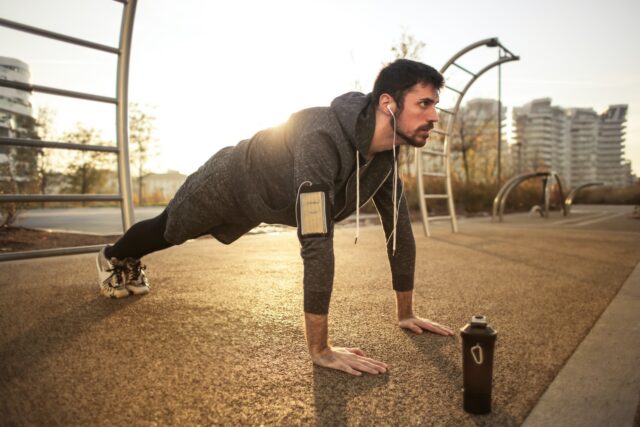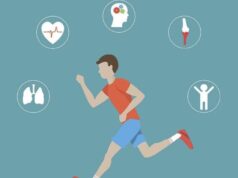
Ask anyone why exercise is good for you and they will automatically start listing various benefits such as weight loss, better fitness, increase in energy and lower blood pressure and risk of diabetes. While these physical benefits certainly make a huge positive impact on one’s life, other good sides of exercise are often neglected—its mental health benefits. No matter how you feel, depressed, stressed or groggy, hitting the gym might help your mind and improve your happiness levels. Below, you will find just some of the many mental (and psychological) benefits of physical activity you can reap by heading outside and getting your sweat on.
It alleviates depression
Since exercise (or any sort of physical activity) boosts the production of endorphins, the body’s “feel good” hormones”, it is a scientifically proved method of improving mood and reducing symptoms of depression. And the good news is that you don’t have to be a pro athlete to reach that exercise-induced euphoria. Moderate levels of exercise every day can help you battle depression so successfully that many mental health professionals recommend trying this natural remedy before putting their patients on medication.
It reduces anxiety
Just like with depression, exercise is very successful at treating anxiety. Thanks to happy hormones produced by your brain and spinal cord during exercise, it helps with tension relief, energy levels and the general feeling of well-being. The best way to use exercise as an anxiety treatment is to focus on your body instead of zoning out. For instance, be mindful as you move your body, pay attention to the way your feet hit the ground and concentrate on your breathing. Joey, in a blog post for The Doe, says that this element of mindfulness will distract your mind from constantly worrying and repeating negative thoughts that make you anxious. Plus, actually paying attention to your form and movement will bring you better physical results as well.
It helps with stress
No matter if you notice you’re stressed or not, reducing this element of our modern lives can make all of us feel better. Exercise boosts the production of norepinephrine which improves cognition, boosts mood and helps clear thinking during stressful events. Additionally, during exercise, our central and sympathetic nervous systems communicate, which is something that improves our overall ability to deal with stress. Running and boxing are great types of physical activity for fighting stress, but if they are not your cup of tea, you can look for the best full-body workouts and give them a shot. Most full-body exercises can be done at the gym, in your local park or at home so there are no excuses not to try them. If you want to exercise at home, listen to some of the tips and recommendations from GarageGymBuilder.
It’s good for people with ADHD
One of the easiest, healthiest and most effective ways to treat ADHD is with exercise. Physical activity boosts everything from mood to memory, concentration and motivation, which is something ADHD patients often struggle with. With increased dopamine, norepinephrine and serotonin levels come better focus and attention. Essentially, exercise acts in a similar way to Adderall or Ritalin.

It fights PTSD
One of the most common stress responses of PTSD or trauma is Immobilization Stress Response. However, by focusing on how your body moves and feels during exercise, you can help your nervous system get “unstuck”. While you’re engaged in physical activity, pay attention to your muscles, joints and bones to reap the most benefits. Some of the best exercises are those that include movements that involve both your arms and legs—walking, running, swimming, compound weight movements and even dancing. If you can, take your workouts outside since spending time in nature also helps with symptoms of PTSD.
It’s a healthy coping mechanism
When facing various challenges in life that make people stressed and anxious, exercise serves as a great replacement for negative behaviors that offer an escape (alcohol, drugs, self-harm). These negative behaviors can even worsen your conditions in the long run, so it’s a great idea to replace them with something as healthy as exercise.
It helps with sleep
Sleeping issues are often triggered by depression, stress, PTSD or anxiety. By engaging in regular physical exercise, you can fix your sleep schedule and improve both your mental and physical health. Exercise increases body temperature which can be calming, but it also regulates your circadian rhythm and allows you to feel sleepy in the evening and fresh in the morning. Warning: exercising too close to bedtime is not recommended by sleep experts, so time your workouts accordingly.
It boosts confidence
As you reap benefits from regular physical activity such as losing weight and gaining muscle, you will notice that you feel much happier about your body. And not just that! If you reach your goal weight or manage to beat your personal best time while running, you’ll get that amazing feeling of accomplishment and pride. All of that can do wonders for your self-esteem and confidence you can later use to better your life on all fronts.
It makes you energized
People struggling with depression and anxiety often feel like they don’t have enough energy to get out of bed. Well, just 30 minutes of exercise every day can boost your energy level and make you ready to face challenges of the day.
Do you like all of these mental health benefits of exercise? If you do, make a good workout schedule and commit to it for at least four weeks. Best results come after 10 or 12 weeks of exercise (three to four times a week) so be consistent and dedicated. Once exercise becomes a part of your lifestyle and you start noticing all the improvements in your life, you’ll never want to live without it again!











